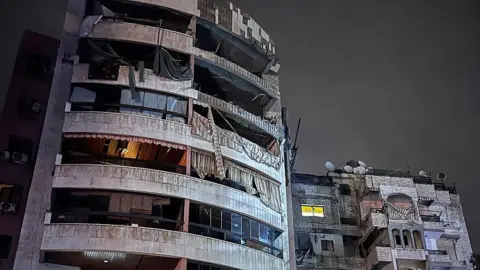Four killed in Israeli strike on Beirut, Lebanon says, despite ceasefire
 AFP
AFPAn Israeli air strike on Beirut's southern suburbs has killed a Hezbollah official and three other people, Lebanon's health ministry says, putting further pressure on a fragile ceasefire between Israel and the Lebanese armed group.
The strike also injured seven people, the health ministry said.
The attack was the second on the Dahieh area, where Hezbollah has a strong presence, in recent days, despite the truce that came into force in November.
The Israeli military said it had targeted Hassan Bdeir, who it alleged had helped Hamas plan an attack against Israeli civilians.
Hezbollah confirmed Bdeir had been killed along with his son, who was also a member of the group.
Lebanon's President Joseph Aoun condemned the strike, calling it a dangerous warning.
Prime Minister Nawaf Salam said it was a "flagrant violation" of the ceasefire.
The strike happened in the middle of the night, without a warning, and images from the scene show the top three floors of an apartment building had been damaged.
The Israel Defence Forces (IDF), Israel Security Agency (ISA) and Mossad spy agency said in a statement that the military conducted a strike in the Dahieh that killed Hassan Bdeir.
They said Bdeir had "recently directed Hamas operatives and assisted them in planning a significant and imminent terror attack against Israeli civilians".
"Due to the immediate threat" posed, they added, Israeli forces "acted to eliminate him and removed the threat". The statement did not give details about the alleged threat, and indicated that the Israeli military would continue to carry out attacks in Lebanon.
Lebanon's health ministry said four people were killed in the strike, including one woman.
The state-run National News Agency identified two of the dead as Ahmed Mahmoud and his sister Hiam, and said their mother was among the wounded.
Later, Hezbollah issued a brief statement that confirmed the deaths of Bdeir, who it described as a "commander", and his son, Ali.
During a visit to the scene of the strike, Hezbollah MP Ali Ammar said the group was exercising "utmost patience and restraint", but warned that "this patience has limits".
Last Friday, Israel carried out its first attack on Beirut since the ceasefire came into force, putting an end to more than 13 months of conflict with Hezbollah, the Iranian-backed militia and political movement.
The Israeli military said it had hit a drone storage unit used by Hezbollah after two rockets were fired from southern Lebanon towards northern Israel.
Hezbollah said it had no involvement in the rocket attack and remained committed to the ceasefire, and no other armed group claimed responsibility.
Despite the deal, Israel has carried out near daily air strikes on people and targets it says are linked to Hezbollah, saying it is acting to stop Hezbollah from rearming. Lebanon's government says those attacks, and the permanence of Israeli soldiers in five locations in southern Lebanon, constitute violations of the truce.
Hezbollah launched its campaign the day after the Hamas attacks on southern Israel on 7 October 2023, saying it was acting in solidarity with Palestinians in the Gaza Strip.
The longstanding conflict escalated and led to an intense Israeli air campaign across Lebanon, and a ground invasion of southern Lebanon.
The offensive killed about 4,000 people in Lebanon - including many civilians - and led to the displacement of more than 1.2 million residents.
Israel's stated goal in its war against Hezbollah was to allow the return of about 60,000 residents who had been displaced from communities in the country's north because of the group's attacks, and to remove it from areas along the border.
